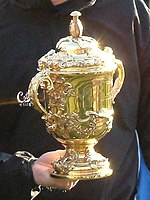Portal:Sports/Selected article/21
The Rugby World Cup is a rugby union tournament contested every four years between the top international Test teams. The tournament was first held in 1987, when the tournament was co-hosted by New Zealand and Australia. The most recent tournament was held in New Zealand in 2011; with their national team — the All Blacks — winning after defeating France in the final. The tournament is administered by the Rugby World Cup Limited, who are themselves wholly owned by the International Rugby Board (IRB) — the sport's international governing body.
The winners are awarded the William Webb Ellis Cup, named after William Webb Ellis, the Rugby School pupil who — according to a popular myth — invented rugby by picking up the ball during a football game. Sixteen teams were invited to participate in the inaugural tournament in 1987, however since 1999 twenty teams have taken part. Hosting of the 2015 World Cup has been awarded to England, while Japan will host the event in 2019.Three teams have won the trophy twice, Australia, New Zealand, and South Africa; while England have won the tournament once.
Prior to the Rugby World Cup, there were only regional international rugby union competitions. The idea of a Rugby World Cup had been suggested on numerous occasions going back to the 1950s, but met with opposition from most unions in the IRFB. The idea resurfaced several times in the early 1980s, with the Australian Rugby Union (ARU) and the New Zealand Rugby Union (NZRU) independently writing to the IRFB seeking to conduct a World Cup tournament. In 1985, Australia, New Zealand and France were in favour of a world cup and, despite knowing that the international sports boycott of the apartheid regime would prevent their participation, the South African delegates also voted in favour. One English and one Welsh delegate switched sides from their initial votes, causing the proposal to pass.

